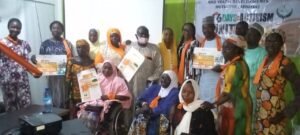
Building food culture to engender exclusive breastfeeding
By Amina Ahmed
Medical experts have identified poor and inadequate breastfeeding as a major reason behind malnutrition. Malnutrition is a major contributor to high infant mortality rate in Nigeria and other African countries.
Food insecurity is a leading cause of the scourge as it inhibits mothers from boosting their dietary intake and produce enough milk to breastfeed their babies.
According to the World Health Organisation, exclusive breastfeeding means that an infant receives only breast milk within the first six months of life.
This means that no water, liquids or solids should be given to the infant with the exception of oral hydration solution, drop/syrup of vitamins, minerals or medicines within the period.
The UN health body highlights that exclusive breastfeeding is essential to achieve optimal growth, development and health of the child.
However, poor breastfeeding is impacting children’s health and development negatively, especially in communities in the northern part of Nigeria, as indicated in the 2021 Multiple Indicator Cluster Survey (MICS).
The study showed that only 26.4 per cent of children are exclusively breastfeed in Bauchi State, while some states in the region have made some progress in the exclusive breastfeeding index.
Adamawa leads the table with 53.3; Bauchi State 26.4 per cent, Gombe 30.7, Plateau 38.6 and Taraba 33.7, per cent, respectively.
This figure illustrates the nexus between poor dietary intake and low breastfeeding in Bauchi State, as mothers could not ensure exclusive breastfeeding in line with recommendations by the WHO.
Sadly; many lactating women in Bauchi State shun exclusive breastfeeding because they cannot afford a balanced diet, to sustain effective milk production occasioned by inflation and rising cost of foodstuff.
Explaining further, Dr Aisha Mohammed, a Paediatric, at Abubakar Tafawa Balewa Teaching Hospital (ATBU-TH), Bauchi, listed hard labour, emotional stress and anxiety as other factors affecting low breast milk production among lactating mothers.
The trend, she said, exposed mothers to rely on baby feed formulas as they could not produce adequate breast milk for their babies.
“Hard labor and emotional stress reduces production of breast milk. Breastfeeding mothers should eat well and have a good rest”, she advised.
According to Mohammed, exclusive breastfeeding also serves as an effective method of family planning, protecting mothers against pregnancy within the six months.
“There is a hormonal pathway that inhibits conception and menstruation when exclusive breastfeeding is practiced.
“Mothers can adopt exclusive breastfeeding as a method for family planning”, she said.
While advocating friendly breastfeeding initiatives by hospitals, workplaces and communities to support lactating mothers, Mohammed added that the practice of exclusive breastfeeding enhances mother-child bonding.
Mohammed highlighted that exclusive breastfeeding was healthy, economical and cheap and advised mothers to ensure an adequate balanced diet.
A lactating mother, Nuratu Maigari, 28, said she could not breastfeed her baby as recommended by experts due to inability to eat well.
Maigari, who is nursing a three-month old baby, said: “I fear that I couldn’t carry on breastfeeding the baby for at least six months exclusively due to the present price in food items.
“I often feel dizzy during this period because my family hardly eats three meals a day.
”I breast fed the other two children exclusively and that was a life sharing experience”.
Mrs Jamila Usman, said things are so difficult and there is not enough food to provide energy for the general body to be healthy.
”I will have to start introducing water for my baby. I cannot do exclusive breastfeeding as I was advised during my antenatal,” she said.
To encourage the practice, health authorities scaled up campaign to mobilise mothers to improve their dietary intake through utilisation of local varieties.
It also aimed to promote the practice of exclusive breastfeeding, especially in rural dwellings in Bauchi state.
The outcome of such sensitisation yield dividends as mothers improvised ways to supplement their dietary intake to enable them to produce adequate milk for their babies.
A first time mother, Hajiya Asabe Umar, recalled that during her antenatal clinic, she was encouraged to feed her baby exclusively with breast milk for the first six months.
“My baby is just two months old. It has not been easy on my husband because he is the only one providing for us now.
“I was told that the foods I eat while breastfeeding are important for my health and my baby”, she said.
Mrs Talatu Mahmoud, a new mother, said she cultivated vegetables in her backyard some months before the delivery time.
She said the vegetables from the backyard garden enabled her to eat foods high nutrients during lactation period.
“My expected day of delivery is around July. So, I used empty sacks and buckets to plant vegetables to take advantage of the rainy season.
”I planted bitter leaf, water leaf, moringa and tomatoes so that no matter how little food I get I will simply add it, which are very important for breastfeeding mothers”.
”I will have to start introducing water for my baby. I cannot do exclusive breastfeeding as I was advised during my antenatal,” she said.
However, Mr Nura Faggo, Communication officer, Breakthrough Action Nigeria (BA-N), said women at community level were trained on using local grains to improve on household meals in the state.
He said that Participants were trained on the various classes of food and the cart was developed to serve as a guiding tool.
“The women were educated on the various classes for food and combination using the local grains.
“We also did pictorial and cart to help them identify the various combination requirement to be used for the family, ” he said.
Faggo said the BA-N conducted a series of food demonstrations to showcase the significance of adequate feeding for exclusive breastfeeding, curb malnutrition and other childhood diseases.
NAN


